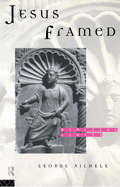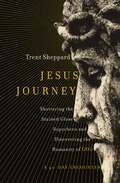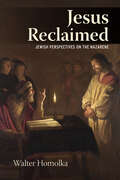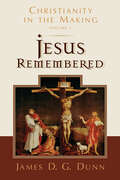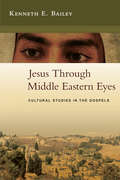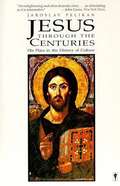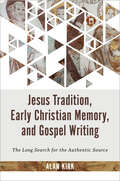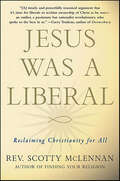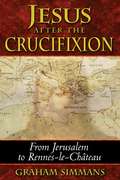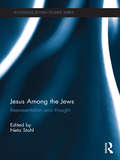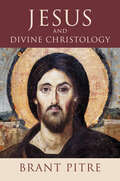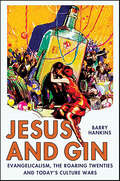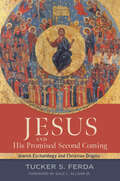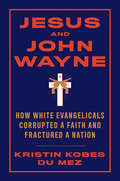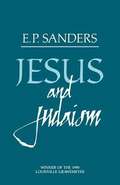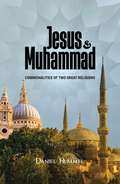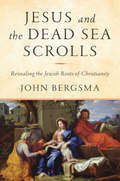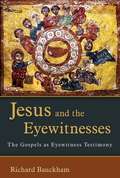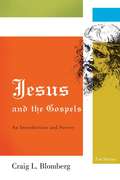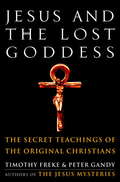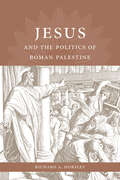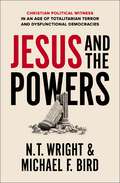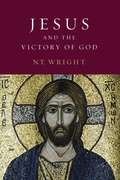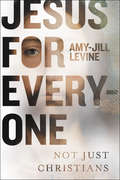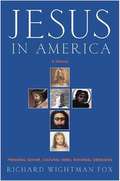- Table View
- List View
Jesus Framed (Biblical Limits Ser.)
by George AicheleBiblical Limits is a new series which brings to the traditional field of Biblical Studies literary criticism, anthropology and gender-based approaches, thus reaching new ways of understanding Biblical texts.Jesus Framed is a collection of essays on reading the gospel of Mark. It uses literary theory, most notably the writings of Roland Barthes, to examine some of the difficulties in the text of Mark. A series of close readings of the gospel of Mark is compared to similar texts, both biblical and otherwise. Drawing on Mark's famous phrase that "to those who are outside all comes through parables" (Mark 4:11-12), Jesus Framed explores the boundaries between insiders and outsiders, those who can and those who cannot find a meaning in the text.
Jesus Journey: Shattering the Stained Glass Superhero and Discovering the Humanity of God
by Trent SheppardJesus was human, like you and me. If the gospel is true, he still is.Christians worldwide believe that Jesus is God. But this belief wasn’t the starting point for Jesus’ earliest followers. While Jesus’ humanity was a given for the disciples, his divinity was a truth they grew into believing—it was a journey of faith. As Christians today, we are also called into a faith journey—this time, to rediscover Jesus’ humanity.Yes, we believe that Jesus is God, but do we truly believe that Jesus is human? And if so, how does that transform our own experience of being human?Through eye-opening yet down-to-earth reflections, Jesus Journey invites you to encounter Jesus again—as if for the first time—by experiencing his breathing, heart-beating, body-and-blood, crying-and-laughing humanity.Join Bible teacher and storyteller Trent Sheppard as he shines new light on the vibrant humanity of the historical Jesus through an up-close look at Jesus’ relationships with Mary and Joseph, with the God he called Abba, with his closest friends and followers, and how, ultimately, his crucifixion and resurrection finally and forever redefine what we mean by the word God. Come encounter the human who radically transforms our view of God.Come encounter the God who forever changes what it means to be human.
Jesus Reclaimed: Jewish Perspectives on the Nazarene
by Rabbi Walter HomolkaAfter centuries of persecution, oppression, forced migrations, and exclusion in the name of Christ, the development of a Jewish “Quest for the Historical Jesus” might seem unexpected. This book gives an overview and analysis of the various Jewish perspectives on the Nazarene throughout the centuries, emphasizing the variety of German voices in Anglo-American contexts. It explores the reasons for a steady increase in Jewish interest in Jesus since the end of the eighteenth century, arguing that this growth had a strategic goal: the justification of Judaism as a living faith alongside Christianity.
Jesus Remembered: Christianity in the Making, Volume 1
by James D. DunnJames Dunn is regarded worldwide as one of today's foremost biblical scholars. Having written groundbreaking studies of the New Testament and a standard work on Paul's theology, Dunn here turns his pen to the rise of Christianity itself. Jesus Remembered is the first installment in what will be a monumental three-volume history of the first 120 years of the faith.Focusing on Jesus, this first volume has several distinct features. It garners the lessons to be learned from the "quest for the historical Jesus" and meets the hermeneutical challenges to a historical and theological assessment of the Jesus tradition. It provides a fresh perspective both on the impact made by Jesus and on the traditions about Jesus as oral tradition -- hence the title "Jesus Remembered." And it offers a fresh analysis of the details of that tradition, emphasizing its characteristic (rather than dissimilar) features. Noteworthy too are Dunn's treatments of the source question (particularly Q and the noncanonical Gospels) and of Jesus the Jew in his Galilean context.In his detailed analysis of the Baptist tradition, the kingdom motif, the call to and character of discipleship, what Jesus' audiences thought of him, what he thought of himself, why he was crucified, and how and why belief in Jesus' resurrection began, Dunn engages wholeheartedly in the contemporary debate, providing many important insights and offering a thoroughly convincing account of how Jesus was remembered from the first, and why.Written with peerless scholarly acumen yet accessible to a wide range of readers, Dunn's Jesus Remembered, together with its successor volumes, will be a sine qua non for all students of Christianity's beginnings.
Jesus Through Middle Eastern Eyes: Cultural Studies in the Gospels
by Kenneth E. BaileyBeginning with Jesus' birth, Ken Bailey leads you on a kaleidoscopic study of Jesus throughout the four Gospels. Bailey examines the life and ministry of Jesus with attention to the Lord's Prayer, the Beatitudes, Jesus' relationships with women, and especially Jesus' parables. Through it all, Bailey employs his trademark expertise as a master of Middle Eastern culture to lead you into a deeper understanding of the person and significance of Jesus within his own cultural context. With a sure but gentle hand, Bailey lifts away the obscuring layers of modern Western interpretation to reveal Jesus in the light of his actual historical and cultural setting. This entirely new material from the pen of Ken Bailey is a must-have for any student of the New Testament. If you have benefited from Bailey's work over the years, this book will be a welcome and indispensable addition to your library. If you are unfamiliar with Bailey's work, this book will introduce you to a very old yet entirely new way of understanding Jesus.
Jesus Through the Centuries: His Place in the History of Culture
by Jaroslav PelikanThe Good, the True, and the Beautiful The nature and purpose of this book: not a life of Jesus, nor a history of Christianity, nor even a history of theological doctrines about Jesus, but a series of images portraying his place in the history of culture.
Jesus Tradition, Early Christian Memory, and Gospel Writing: The Long Search for the Authentic Source
by Alan KirkBreaking a 200-year impasse on the origins of the gospelsBiblical scholars want to get to the roots of the gospels—the very earliest memories of Jesus and his world. Of course, we know about all the major concepts at work here—Q, the Urgospel, priority—but it seems like a definitive solution to the Synoptic problem is hopelessly unattainable. Why the impasse? And where do we go from here?In Jesus Tradition, Early Christian Memory, and Gospel Writing, Alan Kirk guides us through the history of biblical scholars&’ quest for the authentic source. Kirk reveals that outdated assumptions about ancient media realities have caused the past two centuries of academic deadlock. Using cutting-edge scholarship on orality, memory, and tradition formation, he shows how the origins of the gospels may be found in the memory practices of the earliest Jesus communities.Jesus Tradition, Early Christian Memory, and Gospel Writing is an essential resource for scholars and students looking to better understand this complex and rapidly changing field.
Jesus Was a Liberal: Reclaiming Christianity for All
by Scotty McLennanFor the millions of people who identify as liberal Christians. In McLennan's bold call to reclaim ownership of Christianity, he advocates a sense of religion based not on doctrinal readings of scripture but on the humanity behind Christ's teachings. He addresses such topics as intelligent design, abortion, same sex marriage, war. torture and much, much more. As he says in the Preface, "We liberal Christians know in our hearts that there is much more to life than seems to meet the rational eye of atheists; yet we find it hard to support supernatural claims about religion that fly in the face of scientific evidence."
Jesus after the Crucifixion: From Jerusalem to Rennes-le-Château
by Graham SimmansSuggests that Jesus survived the crucifixion, went to Egypt, then settled in France • Reveals new discoveries that show the beginnings of Christianity in Egypt • Presents historical and archaeological research that proves a connection between Jerusalem, Egypt, and Rennes-le-Château in the south of France • Posits Rennes-le-Château as the actual location of Jesus Christ’s tomb, and that writings by him will be found there Jesus did not die on the cross. He survived and went to southern France with his wife, Mary. This possibility is proposed by Graham Simmans, who spent many years on a quest to find the real beginnings of Christianity. Simmans believes that the spread of Christianity beyond Jerusalem was tied to Jesus’s survival of the crucifixion and his subsequent emigration to Europe. Using Coptic and Jewish sources, including the Talmud, that allow a glimpse of the Christian philosophy espoused by Jesus, he contends that true Christianity was brought into France, Britain, and Spain from first century Egypt and Judea, not fourth- and fifth-century Rome. His investigation shows that after a time in Egypt, Jesus settled in Rennes-le-Château, a sophisticated and cosmopolitan center of spiritual diversity. It was a natural move for Jesus to settle in the Narbonne area of France--an area already heavily settled by Jewish and Gnostic groups. Here, safely outside the reach of the cultural dictatorship of the Roman Church, the Gnostic secrets he taught survived the centuries. Later, the Knights Templar centered their activity in the Languedoc region around Rennes-le-Château, where, within the Jewish communities, a well-connected and influential opposition to Rome already existed. This resistance to Rome gave rise to a religious culture that included elements of Gnostic, Pythagorean, and Kabbalistic teachings. Until the Crusades against the Cathar heretics reasserted the dominion of Rome, the culture that flourished around Rennes-le-Château embodied the true essence of Christ’s message.
Jesus among the Jews: Representation and Thought (Routledge Jewish Studies Series)
by Neta StahlFor almost two thousand years, various images of Jesus accompanied Jewish thought and imagination: a flesh-and-blood Jew, a demon, a spoiled student, an idol, a brother, a (failed) Messiah, a nationalist rebel, a Greek god in Jewish garb, and more. This volume charts for the first time the different ways that Jesus has been represented and understood in Jewish culture and thought. Chapters from many of the leading scholars in the field cover the topic from a variety of disciplinary perspectives - Talmud, Midrash, Rabbinics, Kabbalah, Jewish Magic, Messianism, Hagiography, Modern Jewish Literature, Thought, Philosophy, and Art – to address the ways in which representations of Jesus contribute to and change Jewish self-understanding throughout the last two millennia. Beginning with the question of how we know that Jesus was a Jew, the book then moves through meticulous analyses of Jewish and Christian scripture and literature to provide a rounded and comprehensive analysis of Jesus in Jewish Culture. This multidisciplinary study will be of great interest not only to students of Jewish history and philosophy, but also to scholars of religious studies, Christianity, intellectual history, literature and cultural studies.
Jesus and Divine Christology
by Brant PitreDid Jesus see himself as divine? Since the beginning of the quest for the historical Jesus, scholars have dismissed the idea that Jesus could have identified himself as God. Such high Christology is frequently depicted as an invention of the councils of Nicaea and Chalcedon, centuries later. Yet recent research has shown that the earliest Jewish followers of Jesus already regarded him as divine. Brant Pitre tackles this paradox in his bold new monograph. Pitre challenges this widespread assumption and makes a robust case that Jesus did consider himself divine. Carefully explicating the Gospels in the context of Second Temple Judaism, Pitre shows how Jesus used riddles, questions, and scriptural allusions to reveal the apocalyptic secret of his divinity. Moreover, Pitre explains how Jesus acts as if he is divine in both the Synoptics and the Gospel of John. Carefully weighing the historical evidence, Pitre argues that the origins of early high Christology can be traced to the historical Jesus&’s words and actions. Jesus and Divine Christology sheds light on long-neglected yet key evidence that the historical Jesus saw himself as divine. Scholars and students of the New Testament—and anyone curious about the Jewish context of early Christianity—will find Pitre&’s argument a necessary and provocative corrective to a critically underexamined topic.
Jesus and Gin: Evangelicalism, the Roaring Twenties and Today's Culture Wars
by Barry HankinsJesus and Gin is a rollicking tour of the roaring twenties and the barn- burning preachers who led the temperance movement—the anti-abortion crusade of the Jazz Age. Along the way, we meet a host of colorful characters: a Baptist minister who commits adultery in the White House; media star preachers caught in massive scandals; a presidential election hinging on a religious issue; and fundamentalists and liberals slugging it out in the culture war of the day. The religious roar of that decade was a prologue to the last three decades. With the religious right in disarray today after its long ascendancy, Jesus and Gin is a timely look at a parallel age when preachers held sway and politicians answered to the pulpit.
Jesus and His Promised Second Coming: Jewish Eschatology and Christian Origins
by Tucker S. FerdaIn this pioneering study of Scripture and reception history, Tucker S. Ferda shows that the hope for Jesus&’s second coming originated in his own message about the coming of the kingdom after a time of distress. Most historical Jesus scholars take for granted that Jesus&’s second coming was invented by his zealous early followers. In Jesus and His Promised Second Coming, Tucker S. Ferda challenges this critical consensus. Using innovative methodology, Ferda works backward through reception history to Paul and the Gospels to argue that the hope for the second coming originated in Jesus&’s own grappling with the prospect of death and his conviction that the kingdom was near; he expected a return that would coincide with the final judgment and the end of the age within the space of a generation. Ferda also makes a major contribution to the reception history of the Bible, shedding light on how Christians distinguished their faith from Judaism by deriding &“Jewish messianism&” as earthly minded and militaristic. In the early modern period, critics found an expedient way to distance Jesus from this caricature of &“Jewish messianism&”: they pinned the expectation for the second coming on Jesus&’s early followers. A new appreciation for the diversity of Judaism and messianism in the Second Temple period makes possible a fresh reconstruction of Jesus. Bold and historically astute, Jesus and His Promised Second Coming breathes new life into a long-stagnant conversation. It also offers readers fresh insight into the history of Jewish-Christian relations. Students and scholars of the New Testament will need to read and engage with Ferda&’s provocative argument.
Jesus and John Wayne: How White Evangelicals Corrupted A Faith And Fractured A Nation
by Kristin Kobes Du MezA scholar of American Christianity presents a seventy-five-year history of evangelicalism that identifies the forces that have turned Donald Trump into a hero of the Religious Right. How did a libertine who lacks even the most basic knowledge of the Christian faith win 81 percent of the white evangelical vote in 2016? And why have white evangelicals become a presidential reprobate’s staunchest supporters? These are among the questions acclaimed historian Kristin Kobes Du Mez asks in Jesus and John Wayne, which delves beyond facile headlines to explain how white evangelicals have brought us to our fractured political moment. Challenging the commonly held assumption that the “moral majority” backed Donald Trump for purely pragmatic reasons, Du Mez reveals that Donald Trump in fact represents the fulfillment, rather than the betrayal, of white evangelicals’ most deeply held values. Jesus and John Wayne is a sweeping account of the last seventy-five years of white evangelicalism, showing how American evangelicals have worked for decades to replace the Jesus of the Gospels with an idol of rugged masculinity and Christian nationalism, or in the words of one modern chaplain, with “a spiritual badass.” As Du Mez explains, the key to understanding this transformation is to recognize the role of culture in modern American evangelicalism. Many of today’s evangelicals may not be theologically astute, but they know their VeggieTales, they’ve read John Eldredge’s Wild at Heart, and they learned about purity before they learned about sex—and they have a silver ring to prove it. Evangelical books, films, music, clothing, and merchandise shape the beliefs of millions. And evangelical popular culture is teeming with muscular heroes—mythical warriors and rugged soldiers, men like Oliver North, Ronald Reagan, Mel Gibson, and the Duck Dynasty clan, who assert white masculine power in defense of “Christian America.” Chief among these evangelical legends is John Wayne, an icon of a lost time when men were uncowed by political correctness, unafraid to tell it like it was, and did what needed to be done. Trump, in other words, is hardly the first flashy celebrity to capture evangelicals’ hearts and minds, nor is he the first strongman to promise evangelicals protection and power. Indeed, the values and viewpoints at the heart of white evangelicalism today—patriarchy, authoritarian rule, aggressive foreign policy, fear of Islam, ambivalence toward #MeToo, and opposition to Black Lives Matter and the LGBTQ community—are likely to persist long after Trump leaves office. A much-needed reexamination, Jesus and John Wayne explains why evangelicals have rallied behind the least-Christian president in American history and how they have transformed their faith in the process, with enduring consequences for all of us.
Jesus and Judaism
by E. P. SandersThis work takes up two related questions with regard to Jesus: his intention and his relationship to his contemporaries in Judaism. These questions immediately lead to two others: the reason for his death (did his intention involve an opposition to Judaism which led to death?) and the motivating force behind the rise of Christianity (did the split between the Christian movement and Judaism originate in opposition during Jesus' lifetime?).
Jesus and Muhammad: Commonalities of Two Great Religions
by Daniel HummelJesus and Muhammad lived in different times and in different contexts. An absolute comparison of the careers of these two men is not a satisfactory method in understanding the similarities and differences between their teachings. This book approaches this topic from a different perspective. The time that Muhammad preached in Mecca is compared to the time Jesus spent preaching throughout Palestine. This improves the similarities in contexts between them and makes a comparison more valid. The number of similarities outweighs the number of differences when looking at the four books of the Gospel and the chapters of the Qur'an revealed in Mecca. On issues related to prayer, the Oneness of God, charity, the Hereafter and forgiveness the teachings in these two books are practically the same. A number of core theological issues surfaced in the Book of John do clash with Qur&’anic teachings about the person of Jesus. These differences and the possible reasons for them are explored in this book. The conclusion of this book is that Muslims and Christians have more shared values and even theological similarities than differences. It is recommended that Muslims and Christians should spend more time understanding these commonalities.
Jesus and the Dead Sea Scrolls: Revealing the Jewish Roots of Christianity
by John BergsmaA major new work on the Dead Sea Scrolls, the oldest sacred documents of Judaism, which reveals their surprising connections to early Christianity. “A luminous treatment of a fascinating subject! Highly recommended!”—Scott Hahn, author of The Fourth Cup From award-winning scholar John Bergsma comes an intriguing book that reveals new insights on the Essenes, a radical Jewish community predating Christianity, whose existence, beliefs, and practices are often overlooked in the annuls of history. Bergsma reveals how this Jewish sect directly influenced the beliefs, sacraments, and practices of early Christianity and offers new information on how Christians lived their lives, worshipped, and eventually went on to influence the Roman Empire and Western civilization. Looking to Hebrew scripture and Jewish tradition, Bergsma helps to further explain how a simple Jewish peasant could go on to inspire a religion and a philosophy that still resonates 2,000 years later. In this enriching and exciting exploration, Bergsma demonstrates how the Dead Sea Scrolls—the world's greatest modern archaeological discovery—can shed light on the Church as a sacred society that offered hope, redemption, and salvation to its member. Ultimately, these mysterious writings are a time machine that can transport us back to the ancient world, deepen our appreciation of Scripture, and strengthen our understanding of the Christian faith.“An accessible introduction . . . This is a handy entry point for readers unfamiliar with Essenes or those interested in the Dead Sea Scrolls.”—Publishers Weekly
Jesus and the Eyewitnesses: The Gospels as Eyewitness Testimony
by Richard Bauckham'Jesus and the Eyewitness' argues that the four Gospels are closely based on the eyewitness testimony of those who knew Jesus. The author challenges the assumption that the accounts of Jesus circulated as 'anonymous community traditions', asserting instead that they were transmitted in the name of the original eyewitnesses. To drive home this controversial point, Bauckham draws on internal literary evidence, the use of personal names in first-century Jewish Palestine, and recent developments in the understanding of oral tradition. Jesus and the Eyewitnesses also taps into the rich resources of modern study of memory, especially in cognitive psychology, refuting the conclusions of the form critics and calling New Testament scholarship to make a clean break with this long-dominant tradition. Finally, Bauckham challenges readers to end the classic division between the 'historical Jesus' and the'Christ of faith', proposing instead the 'Jesus of testimony' as presented by the Gospels. Sure to ignite heated debate on the precise character of the testimony about Jesus, Jesus and the Eyewitnesses is a groundbreaking work that will be valued by scholars, students, and all who seek to understand the origins of the Gospels.
Jesus and the Gospels: An Introduction and Survey (2nd edition)
by Craig L. BlombergThis second edition of Jesus and the Gospels prepares readers for an intensive study of Matthew, Mark, Luke, John, and the events they narrate. Craig Blomberg considers the historical context of the Gospels and sheds light on the confusing interpretations brought forth over the last two centuries. The original 1997 book won a Gold Medallion Award from the Evangelical Christian Publishers Association, and this updated version, factoring in new scholarship, debate, critical methods, and the ongoing quest of the historical Jesus, ensures the work will remain a top tool for exploring the life of Christ through the first four books of the New Testament.
Jesus and the Lost Goddess: The Secret Teachings of the Original Christians
by Timothy Freke Peter GandyWhy Were the Teachings of the Original Christians Brutally Suppressed by the Roman Church?* Because they portray Jesus and Mary Magdalene as mythic figures based on the Pagan Godman and Goddess* Because they show that the gospel story is a spiritual allegory encapsulating a profound philosophy that leads to mythical enlightenment* Because they have the power to turn the world inside out and transform life into an exploration of consciousnessDrawing on modern scholarship, the authors of the international bestseller The Jesus Mysteries decode the secret teachings of the original Christians for the first time in almost two millennia and theorize about who the original Christians really were and what they actually taught. In addition, the book explores the many myths of Jesus and the Goddess and unlocks the lost secret teachings of Christian mysticism, which promise happiness and immortality to those who attain the state of Gnosis, or enlightenment. This daring and controversial book recovers the ancient wisdom of the original Christians and demonstrates its relevance to us today.From the Trade Paperback edition.
Jesus and the Politics of Roman Palestine: Revised With A New Preface (Center And Library For The Bible And Social Justice Ser.)
by Richard A. HorsleyThis comprehensive critical analysis of the historical Jesus examines his mission and involvement in the conflicted politics of ancient Palestine.In Jesus and the Politics of Roman Palestine, Richard A. Horsley brings the context and implications of recent historical research to bear on our understanding of Jesus of Nazareth. Based on a critical reconsideration of the Gospels and contemporary sources for Roman imperial rule in Judea and Galilee, Horsley argues that Jesus was deeply concerned with the politics of his day. Drawing on anthropological studies of peasant politics, Horsley discerns how Jesus, as a Moses- and Elijah-like prophet, generated a movement of renewal in Israel that was focused on village communities.Following the traditional prophetic pattern, Jesus pronounced God’s judgment against the rulers in Jerusalem and their Roman patrons. This confrontation with the Jerusalem rulers and his martyrdom at the hands of the Roman governor, however, became the breakthrough that empowered the rapid expansion of his movement in the immediately ensuing decades. In the broader context of this comprehensive historical construction of Jesus’s mission, Horsley also presents a fresh new analysis of Jesus’s healings and exorcisms and his conflict with the Pharisees, topics that have been generally neglected in the last several decades.
Jesus and the Powers: Christian Political Witness in an Age of Totalitarian Terror and Dysfunctional Democracies
by N. T. Wright Michael F. BirdAn urgent call for Christians everywhere to explore the nature of the kingdom amid the political upheaval of our day.Should Christians be politically withdrawn, avoiding participation in politics to maintain their prophetic voice and to keep from being used as political pawns? Or should Christians be actively involved, seeking to utilize political systems to control the levers of power?In Jesus and the Powers, N. T. Wright and Michael F. Bird call Christians everywhere to discern the nature of Christian witness in fractured political environments. In an age of ascending autocracies, in a time of fear and fragmentation, amid carnage and crises, Jesus is king, and Jesus&’s kingdom remains the object of the church's witness and work.Part political theology, part biblical overview, and part church history, this book argues that building for Jesus's kingdom requires confronting empire in all its forms. This approach should orient Christians toward a form of political engagement that contributes to free democratic societies and vigorously opposes political schemes based on autocracy and nationalism. Throughout, Wright and Bird reflect on the relevance of this kingdom-oriented approach to current events, including the Russian-Ukraine conflict, the China-Taiwan tension, political turmoil in the USA, UK, and Australia, and the problem of Christian nationalism.
Jesus and the Victory of God (Christian Origins and the Question of God, Volume #2)
by N. T. WrightIn a responsibly provocative new portrayal of several old issues raised by the quest of the historical Jesus, the author of The Climax of the Covenant deals with some questions.
Jesus for Everyone: Not Just Christians
by Amy-Jill LevineWhy Jesus’s historic and cultural influence makes him fascinating, provocative, and relevant for everyone, not only Christians.Two thousand years after his birth and death, Jesus of Nazareth continues to be of vital interest. Yet much of the scholarship around Jesus focuses on his religious significance. Jesus for Everyone examines his most famous teachings from a fresh perspective, exploring how they have continued to shape ethics and civilization in the West for two millennia.Even for those who reject faith, Jesus’s life and his philosophy are important to study, writes renowned biblical scholar and author Amy-Jill Levine, because of the insights they hold for us today. Poring through scripture, analyzing what historical scholarship has revealed about Jesus’s views on a number of subjects—including women—reveals surprising messages sure to be fascinating to all readers.Placing Jesus of Nazareth within his historical context, Levine brings him vividly into focus and invites everyone from faithful Christians, agnostics, and the most committed nonbelievers to appreciate his lasting impact on the modern world.
Jesus in America
by Richard W. FoxWhere else but America do people ask: What Would Jesus Do? What Would Jesus Drive? What Would Jesus Eat? "This book is for believers and non-believers alike. It is not a book about whether one should believe in Jesus, but about how Americans have believed in and portrayed him."--from the Introduction Jesus in America is a comprehensive exploration of the vital role that the figure of Jesus has played throughout American history. Written by one of our most distinguished historians, Richard Wightman Fox, this book provides a brilliant cultural history of Jesus in America from its origins to today, demonstrating how Jesus is the most influential symbolic figure in our history. Benjamin Franklin understood Jesus as a wise man worthy of imitation. Thomas Jefferson regarded him as a moral teacher. The assassination of Abraham Lincoln, which occurred on Good Friday, was popularly interpreted as paralleling the crucifixion of Jesus . . . as one preacher put it, "Jesus Christ died for the world, Abraham Lincoln died for his country." Elizabeth Cady Stanton appropriated Jesus' message to champion women's rights. George W. Bush named Jesus as his favorite political philosopher--and several other GOP candidates followed suit--during the last presidential race. As we have seen in recent presidential elections, the name of Jesus is often thrust into the center of political debates, and many Americans regularly enlist Jesus, their ultimate arbiter of value, as the standard-bearer for their views and causes. Fox shows how Jesus influenced such major turning points in American history as: Columbus's voyage of discovery The arrival of the English puritans and Spanish missionaries The American Revolution The abolition of slavery and the Civil War Labor movements Social and cultural revolutions of the sixties and beyond The swelling tide of Christian voices in the politics and entertainment of today Fox gives an expert, lively account of all the ways that Jesus is portrayed and understood in American culture. Extensively illustrated with images representing the multitude of American views of Jesus, Jesus in America reveals how fully and deeply Jesus is ingrained in the American experience.
